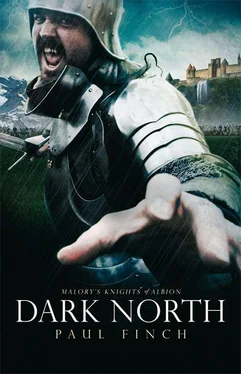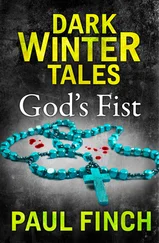Paul Finch - Dark North
Здесь есть возможность читать онлайн «Paul Finch - Dark North» весь текст электронной книги совершенно бесплатно (целиком полную версию без сокращений). В некоторых случаях можно слушать аудио, скачать через торрент в формате fb2 и присутствует краткое содержание. Год выпуска: 2012, Издательство: Abaddon Books, Жанр: Исторические приключения, Фэнтези, на английском языке. Описание произведения, (предисловие) а так же отзывы посетителей доступны на портале библиотеки ЛибКат.
- Название:Dark North
- Автор:
- Издательство:Abaddon Books
- Жанр:
- Год:2012
- ISBN:нет данных
- Рейтинг книги:5 / 5. Голосов: 1
-
Избранное:Добавить в избранное
- Отзывы:
-
Ваша оценка:
- 100
- 1
- 2
- 3
- 4
- 5
Dark North: краткое содержание, описание и аннотация
Предлагаем к чтению аннотацию, описание, краткое содержание или предисловие (зависит от того, что написал сам автор книги «Dark North»). Если вы не нашли необходимую информацию о книге — напишите в комментариях, мы постараемся отыскать её.
Dark North — читать онлайн бесплатно полную книгу (весь текст) целиком
Ниже представлен текст книги, разбитый по страницам. Система сохранения места последней прочитанной страницы, позволяет с удобством читать онлайн бесплатно книгу «Dark North», без необходимости каждый раз заново искать на чём Вы остановились. Поставьте закладку, и сможете в любой момент перейти на страницу, на которой закончили чтение.
Интервал:
Закладка:
“I don’t understand this concern.” Rufio caught a daffodil and blew a kiss to the young girl who’d thrown it. “Did any Roman embassy ever receive such a welcome?”
“Don’t be fooled. In the old days it was quite common for us to be flattered by those we planned to conquer. It’s a mindset born of fear — they hope to buy us off with friendship. But King Arthur is no fool. He will pay lip-service to our greatness, and he may even discuss terms with us, but in the end, if necessary, he will show his steel. Our role here is purely investigative, but we must keep our wits about us. The less mooning over a woman who can never be yours the better.”
Rufio laughed. “It took New Rome two decades to recapture the old Western Empire’s lost provinces, but only one night for Countess Trelawna to capture my heart. Which of those powers is more deserving of fealty?”
The parade entered the Royal Plaza, a wide, smooth-paved boulevard running like an artery through the very heart of the city, and lined with shops of a more esoteric ilk: booksellers, silversmiths, perfumeries. It terminated in front of the magnificent marble basilica of St. Stephen’s cathedral, behind which loomed the battlemented edifice of Camelot’s palace.
The cathedral was built in the Byzantine style, with turrets, pediments, spires and arches, and a plethora of stained-glass windows; it must have stood two hundred feet at its apex. But the fortress, in whose shadow it huddled, was awe-inspiring, perched on a precipitous man-made mound, from which it overlooked the whole of the city, and doubtless the plains and woods far beyond. Its colossal ramparts and towers billowed with thousands of knightly banners.
The thought that one day New Rome might have to besiege Arthur in this citadel was enough to chill even the blood of an optimist like Felix Rufio.
King Arthur awaited his guests enthroned at the top of the basilica’s stone steps, a handful of knights and prelates gathered behind him. In honour of the day, none of his warriors were mailed. Instead, they wore hose and slippers and comfortable courtly robes; but in mark of their status they also carried swords at their hips.
“Behold,” Sir Cador said, as the embassy embarked from the far end of the Plaza, “the masters of the world.”
“At one time that was no idle boast,” Archbishop Stigand 10replied, leaning on his crosier. He was the most visibly delicate among them; a gangling beanpole of a man, who walked with a curious halting gait, rather like a heron. His face was lean, his nose an axe-blade. Aside from his tonsure, his hair was long, white and wispy. He alone was decked in full ceremonial regalia: his white satin tabard and cloak, his silver mitre.
“People should learn not to live on past glories,” Cador replied.
“They are without doubt the masters of Christendom,” Archbishop Stigand retorted. “Thanks to Emperor Lucius, the light of Christ now shines back into such morally desolated lands as central Gaul and lower Germany, Spain, North Africa…”
“At what price, I wonder?” Sir Bedivere said.
The archbishop affected shock. “Surely no price is too high?”
Cador snorted. “Easy to say when you’ve not been subjected to the Imperial taxation structure.”
“I hear that Emperor Lucius has proved himself a fair and equitable master,” the archbishop said. “That he taxes his new provinces heavily, but in return his legions rebuild their roads and bridges, their civic administrations…”
“It’s true that even civilisation has its price,” Bedivere replied. “There are several Episcopal princes in the party approaching us. I’d imagine each one will have at least half an eye on the many tithes and titles to be had in a kingdom as grateful as ours will be.”
Archbishop Stigand pondered this. He was a man who professed great piety, but in reality often searched for new ways by which to cement his position as senior churchman in the British Isles. He lived in constant fear that his rivals at Canterbury and York might someday steal a march on him, and as such had spies at every level in the Royal Court which he thought nobody else knew about. He cleared his throat before speaking again.
“My lords, just because we in the Camelot See approve New Rome’s reinvigorated Christian mission does not mean we endorse it heartily. This will be, I imagine, a mere fact-finding trip… perhaps an examination of the health and spirit of our nation. I shall be glad to inform our Roman brethren that spiritually we want for nothing, and that our lord, the King, has maintained the Pax Britannica as well as any Roman governor who ever held sway in this land.”
“Who knows,” Bedivere said, “there may be some among them who aren’t already aware of this, though I doubt it will make much difference.”
The ambassadors were now in close proximity, and at last King Arthur spoke.
“Enough debate, gentlemen.” He rose to his feet. “We can save that for the Council chamber. At this moment we welcome our guests with open arms.”
Arthur, too, was clad informally. He wore his golden crown, but aside from that his only other royal garment was his sleeveless gold and purple cape, which was draped over a black doublet, tight black trousers, and black leather riding boots. He was trim at the waist but possessed of a broad, strong frame, typical of a man who had spent many long years wielding the broadsword and the battle-axe. He wore his sunny-brown beard and moustache neatly trimmed, but his mane long and cut square at the shoulder. There were nicks and scars on his face, as with all those who had borne hardships in war, but he was as handsome a devil now as he’d ever been; lean-faced and square-jawed, his deep hazel eyes shining with wit and wisdom.
The first ambassador to approach was Bishop Proclates of Palermo, who descended from his carriage with the aid of two pages, doffed his chaperon and bowed.
“Hail Arthur,” he said loudly, “son of Uther and Igrane, King of all the Britons, Protector of the Holy Mother Church, Guardian of Chivalry, slayer of demons, devils and heathens… I bring greetings from the court of New Rome, and the seat of his Imperial Majesty, Lucius Julio Bizerta.
“Hail, Bishop Proclates of Palermo,” Arthur replied. “Statesman, writer, Librarian of the Fathers, founder of the new Christian universities in Alexandria and Nisibis, scourge of all Vandals and Aryan heretics.”
Several of the ambassadors glanced at each other, surprised that the King of the Britons even recognised Bishop Proclates, let alone knew his personal history.
“I told you,” Malconi murmured to his nephew. “This Arthur is nobody’s fool.”
“Any fool can send a scribe to research a biography,” Rufio replied.
Arthur continued his address: “Hail, Bishop Pelagius of Tuscany, healer of schisms, reliever of famines, and restorer of vanquished monasteries. Hail Consul Publius, senatorial voice of the plebeians, advocate of land reform, master of the judiciary. Hail Lord Ardeus Vigilano, Duke of Spoleto, soldier, sailor, scholar, founder of the Alchemical Order…”
One by one, Arthur addressed them, drawing nods and smiles from each individual, who, even if they didn’t demonstrate it, were mildly disconcerted that he had not only known they were coming, but that he knew their pedigree to the finest detail.
“Nobody’s fool,” Malconi said again. “Remember that, Felix. And it applies equally to his Knights of the Round Table.”
“I only see a handful,” Rufio remarked. “Where are the rest?”
“They’ll be here. And sooner rather than later.”
Five
The roads leading down from the north, what few there were, were quagmires. If this wasn’t difficult enough for Lucan and his retinue, winter returned briefly. As they traversed the wilderness of Elmet, with its rugged moors, rocky outcrops and deep, dark forests, they were assailed by wind, heavy rain and flurries of sleet.
Читать дальшеИнтервал:
Закладка:
Похожие книги на «Dark North»
Представляем Вашему вниманию похожие книги на «Dark North» списком для выбора. Мы отобрали схожую по названию и смыслу литературу в надежде предоставить читателям больше вариантов отыскать новые, интересные, ещё непрочитанные произведения.
Обсуждение, отзывы о книге «Dark North» и просто собственные мнения читателей. Оставьте ваши комментарии, напишите, что Вы думаете о произведении, его смысле или главных героях. Укажите что конкретно понравилось, а что нет, и почему Вы так считаете.











![Paul Finch - A Wanted Man [A PC Heckenburg Short Story]](/books/702381/paul-finch-a-wanted-man-a-pc-heckenburg-short-sto-thumb.webp)
